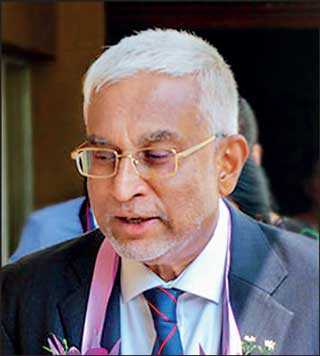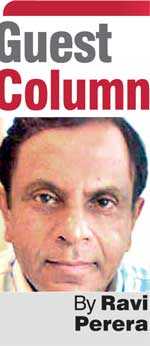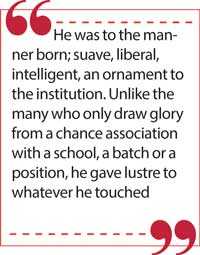Saturday Feb 07, 2026
Saturday Feb 07, 2026
Friday, 27 December 2019 00:00 - - {{hitsCtrl.values.hits}}
“God, give us men!
A time like this demands strong minds, great hearts, true faith and ready hands;
Men whom the lust of office does not kill; Men whom the spoils of office cannot buy; Men who possess opinions and a will: Men who have honour: Men who will not lie: Men who can stand before a demagogue and damn his treacherous flatteries without winking!
 |
Before long, he was in the leading ranks of the legal profession, with a reputation for unerring professionalism, strong integrity and abiding decency. It was the general opinion that the all-important matter of ‘fees’ with him was only a secondary issue, the satisfaction he derived in the practice of the law was paramount |
Tall men, sun-crowned, who live above the fog, in public duty, and in private thinking; For while the rabble, with their thumb-worn creeds, their large professions and their little deeds, mingle in selfish strife, lo! Freedom weeps, Wrong rules the land and waiting justice sleeps.”-
God, Give Us Men! - Josiah Gilbert Holland
The sudden passing of Supreme Court Justice Prasanna Jayawardena, is a sad reminder of the impermanence of all things, however gifted or high, no person can escape the human condition.
I first met Prasanna when we started the Colombo (host) Leo Club in the mid-1970s. The club was launched ceremonially at the Jaycees Secretariat down Wijerama Mawatha, in those days a prestigious venue for such functions.
Prasanna was its inaugural President, and I was the editor of the club newsletter. His parents, Stanley and Sujatha were well-known social workers and active in the Colombo (host) Lions Club. I was introduced to the Leo Club by Marion Abeysuriya, my English teacher.
Stanley and Sujatha Jayawardena were an impressive couple; well read, urbane, and imposing. Busy as they were, in them, the fledgling Leo Club had a ready source of help and guidance, graciously given, and even volunteered. 
One time, when I had no way of typing out the club newsletter (before sending it through the Roneo machine) Mrs. Jayawardena referred me to a friend, who kindly spent an entire morning typing (and editing!) what I had scrawled on scrap paper. Later, I learnt that she was a very senior officer at the Inland Revenue Department.
Among the Leo projects I recall was an undertaking to clean a ward at the Deaf and Blind school in Ratmalana. I think Prasanna had visited the school earlier and agreed on the ‘scope of work’. Mid-morning, at the Bambalapitiya bus stand, we all trooped into a crowded CTB bus (the only transport available in those days) with our ‘gear’ of scrubs, cleaning material, paint and brushes.
The Leos ‘worked’ till late afternoon and then caught a bus back to Bambalapitiya where we proceeded to a repast of thosai, warm gravy and hot sambols at the irresistible Greenland’s café situated on the green and leafy ‘Shrubbery Gardens’.
If I remember right, Prasanna entered the law faculty about that time. Although such judgment was beyond our young minds then, now recalling our earnest but adolescent ventures into social service, I think the qualities that shone right through Prasanna’s brilliant professional life showed even then. He was intelligent, responsible and mature in all his undertakings.
Those adolescent years are only fleeting, and soon we drifted into our own career paths. Then on, I met Prasanna only occasionally.
After completing his law studies, Prasanna did not follow the typical career path of a lawyer, opting instead to join an international banking corporation, where he worked for many years. Then, perhaps tiring of the routine of banking minutiae, Prasanna answered the call of law.
Before long, he was in the leading ranks of the legal profession, with a reputation for unerring professionalism, strong integrity and abiding decency. It was the general opinion that the all-important matter of ‘fees’ with him was only a secondary issue, the satisfaction he derived in the practice of the law was paramount.
About four years ago, in another surprise move, Prasanna decided to accept an offer of a judgeship on our Supreme Court. As described by the country’s Constitution “the judicial power of the people shall be exercised by Parliament through courts…”.
It is said that the law is a jealous mistress, with varied allurements. Having argued the law from the Counsel’s table, Prasanna would now exercise the ‘peoples’ judicial power’ as a judge of the apex court.
He was to the manner born; suave, liberal, intelligent, an ornament to the institution. Unlike the many who only draw glory from a chance association with a school, a batch or a position, he gave lustre to whatever he touched.
I haven’t had the occasion to read any of his judgements, but undoubtedly they were well considered, reasoned and just.
We cannot choose the times, nor the circumstances of our lives. In a society, impoverished not only in a material sense: beholding institutions politicised and corrupted to the point of no return: confronting men ‘with thumb-worn creeds, large professions and little deeds’: one can be forgiven for giving up on the absolutes, to tread the path of the lesser evil. Inevitably, in the minds of most citizens, the name of Justice Prasanna Jayawardena would be associated with the three-member Presidential Commission that inquired into the issuance of Treasury Bonds in the period February 2015 to March 2016.
Naturally, Justice Jayawardena who was a member of the Commission, played an important role in the proceedings. Going by the widely publicised details, it was apparent that the processes of the issuance of Bonds were deeply corrupted. Despite the several hearings and their findings, the matter yet remains unresolved, the multiplicity of inquiries only exhibiting the defects of our investigative/judicial processes, than their merits.
Was this a simple question of a conflict of interest, or, was there a deeper conspiracy, a cunningly thought out orchestration of matters, both before and after the fact, to facilitate what amounted to a naked crime against the country?
Like so many other recent crimes, there is no closure to the matter, the ‘people’s judicial power’ is yet to speak.
The greatest homage we can pay to the memory of a good judge is to conclude a process of justice to which he gave much.